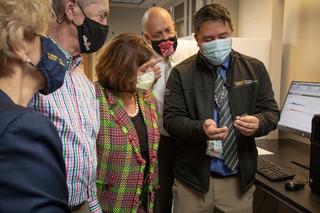Innovative platform pairs mass spectrometry with machine learning

Credit: UC Davis Health
A partnership between UC Davis and Maurice J. Gallagher, Jr., chairman and CEO of Allegiant Travel Company, has led to a new rapid COVID-19 test.
A recent study published Nature Scientific Reports shows the novel method to be 98.3% accurate for positive COVID-19 tests and 96% for negative tests.
“This test was made from the ground up,” said Nam Tran, lead author for the study and a professor of pathology in the UC Davis School of Medicine. “Nothing like this test ever existed. We were starting with a clean slate.”
The novel COVID-19 test uses an analytical instrument known as a mass spectrometer, which is paired with a powerful machine-learning platform to detect SARS-CoV-2 in nasal swabs. The mass spectrometer can analyze samples in minutes, with the entire process taking a total of about 20 minutes.
The accuracy matches or outperforms many of the current COVID-19 screening tests. The new testing method may allow for the rapid screening of large numbers of individuals for businesses, schools, venues and other large facilities. The project originated with Gallagher, a UC Davis alumnus and a longtime supporter of innovation and entrepreneurship at UC Davis.
Last year, when the pandemic brought the airline and hospitality industries almost to a standstill, he began conceptualizing approaches that would allow people to gather again safely.
Gallagher approached H. Rao Unnava, professor and dean of the UC Davis Graduate School of Management, who connected him with Tran at the School of Medicine.
Gallagher and UC Davis entered into a Sponsored Research Agreement, with support from Shimadzu Scientific Instruments, to develop an automated COVID-19 test on a mass spectrometer.
Mass spectrometers are essential analytic tools used by a wide variety of industries for research and testing.
This is the first test for COVID-19 that pairs mass spectrometry with robotics and a robust automated machine learning platform to rapidly deliver test results. The coupling of these unique elements not only allows testing for COVID-19 but may be able to quickly adapt to detect other diseases and perhaps future pandemic organisms.
“Mr. Gallagher, through his generosity as an alum, has shown how business and universities can work together in solving problems of critical importance to the world,” said Unnava. “I am glad that this groundbreaking work will continue to build on the reputation of UC Davis as a place where you always ‘Expect Greater.'”
Project builds on the prior success of MILO platform
The collaboration is part of a new center in the School of Medicine, the UC Davis Center for Diagnostic Innovation.
“This game-changing, rapid new COVID-19 test speaks to the deep expertise of our faculty and scientists to find novel solutions to pressing global health challenges,” said Allison Brashear, dean of the UC Davis School of Medicine. “It’s this kind of innovation and collaboration that has been the hallmark of our response to the pandemic.”
To ensure support for the study’s analytic portion, Tran enlisted Hooman Rashidi, a longtime collaborator and a professor in the Department of Pathology and Laboratory Medicine.
The machine, a mass spectrometer MALDI-TOF, or matrix-assisted laser desorption/ionization time-of-flight, uses a laser to create small particles — ions — from large molecules in the testing sample. These ionized particles create signals that can be used to identify many compounds, including those associated with microorganisms and pathogens.
For the study, 226 nasal swabs from UC Davis’ biorepository of COVID-19 tests were ionized in the Shimadzu 8020. The swabs were from leftover samples and volunteers who consented to the study. Some of the participants had COVID-19 symptoms, and some were asymptomatic.
The hundreds of peaks and signals produced by the ionized test swabs were analyzed by the automated machine learning platform MILO (Machine Intelligence Learning Optimizer). Machine learning is a subset of artificial intelligence, or AI. Tran, Rashidi and Samer Albahra are the co-developers of MILO. The platform has previously been used to predict severe infections and acute kidney disease.
For the COVID-19 test, MILO finds distinguishing patterns among the many mass spectrometry peaks and signals and deciphers which patterns correspond to the presence or absence of the SARS-CoV-2 virus in the samples.
MILO accomplished the analysis in a fraction of the time that a non-automated machine-learning approach would have taken. “This meant drastically expediting the study without compromising any performance measures,” said Rashidi.
Gallagher has launched a new startup, SpectraPass, to develop the rapid, automated system into a means to facilitate opening businesses and the economy.
Experts at UC Davis Health are helping guide the SpectraPass team through the scientific, machine learning and clinical steps needed to move the COVID-19 testing technology closer to emergency use authorization by the Food and Drug Administration (FDA).
“The COVID-19 pandemic not only brought the world’s commerce and travel to a halt – it also took away our fundamental human interaction, our freedom to be together,” said Gallagher. “This project has resulted in a real breakthrough that can not only provide instant, accurate information about COVID infection, but can be an important part of addressing other viruses and even developing therapies. The excitement of working with the team at UC Davis is in knowing we are helping make sure our children and grandchildren are better equipped to deal with potential pandemics in the future.”
The partnership exemplifies the goals of Aggie Square, which brings together the university, community and industry to connect and collaborate.
“As a top-tier research university known for its excellence and disciplinary breadth, UC Davis is exceptionally well-positioned to work with our industry partners on groundbreaking innovations that benefit society,” said Mary Croughan, provost and executive vice chancellor.
###
Additional authors on the study include Taylor Howard, Julia Loegering, Brett Phinney, and Michelle Salemi, University of California, Davis; Ryan Walsh, Shimadzu Scientific Instruments; and John Pepper, Allegiant Travel Company.
Link to video: https:/
Multimedia file: https:/
Media Contact
Lisa Howard
[email protected]
Original Source
https:/
Related Journal Article
http://dx.




